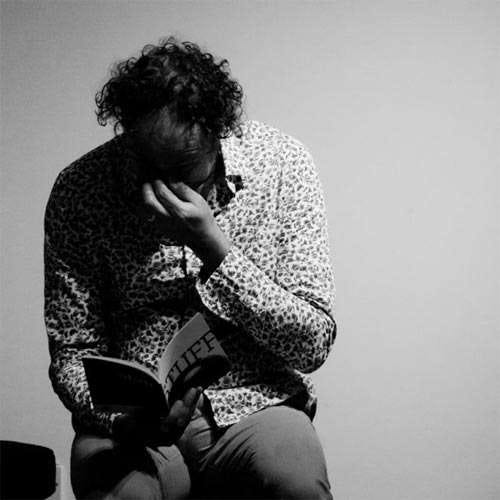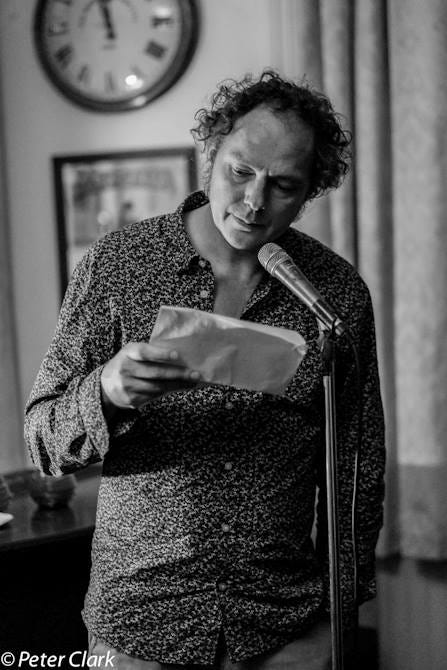Why Writers Shouldn't Sell Themselves Short
Self-Promotion for the Self-Doubting Author, plus in person and online events to join this month
Happy Friday Scribblers,
I wanted to say a big thank you to those who bought a book, or a tote bag, or a year subscription after our call out for support, it was really moving to me to see the community Fly on the Wall has built over the past five years, and a big thank you for caring about diverse and political literature,
We’re soon to be on the road at Leeds Lit Fest, where Elliot J Harper (author of quirky science fiction novel New Gillion Street) will take to the stage from 3pm, and we’ll be nattering with you all day from 11am. Free tickets here.
If you can’t make it to Leeds, why not join us online for some poetry?
Our current website bestseller, Morag Anderson, will be celebrating the online launch of her Aryamati Prize-winning pamphlet, And I Will Make of You a Vowel Sound - described by the powerhouse of poetry Joelle Taylor as ‘Delicate and furious’. It also happens to be Cáit & Alex’s birthday - so come celebrate with us! Tickets here
Today we have a piece on the author as a reluctant self-promoter, by short story author and journalist Charlie Hill, who published ‘The State of Us’ with FOTW last year.
His work has been compared by his peers to Georges Perec, Beckett and Kafka.
“this is no fairy story but a story of human beings”
In Charlie Hill’s satirical short story collection, people stare. Behind twitching curtains. Behind the lens of a camera. With an eye reminiscent of Samuel Beckett, Charlie Hill invites you to be privy to strange social experiments, laugh at the pomp of the privileged classes and dwell in space, floating in the introspection of your thoughts. As these stories delve into questions of human nature, you just might recognise yourself…
Why Writers Shouldn't Sell Themselves Short
by Charlie Hill
I think most writers are, by now, aware of the importance of self-promotion, of engaging fulsomely in the process of getting their book reviewed and read and heard. We labour assiduously over texts, but getting our books noticed requires just as much effort. What is perhaps less often discussed is the substance of this promotional work.
Charlie Hill by Dave McGowan
I’ve been promoting my work since 2010, the year my first novel was published. And my natural instincts over this time have been to sell myself short. There are several reasons for this. Perhaps most obviously, I’m naturally self-deprecating. This might have something to do with my heritage – I’m told it’s a Brummie thing – or my circumstances – I left school at 16 and am unsure how my auto-didacticism stacks up – but either way it doesn’t help. I also have a pathological antipathy to being thought of as pretentious. Then there’s my writing itself. I’ve always thought people get more out of art the more they put in; the harder they have to listen, more carefully they have to watch, closer they have to read etc etc. As such, I’m reluctant to give too much away about my writing, preferring to let it speak for itself.
The combination of these traits means that as enthusiastically as I’ve embraced the process of self-promotion, my approach to it has invariably been compromised. I’ve been flippant about my influences – ‘His literary heroes are Jim Crace, AL Kennedy and Natalie Haynes, not least because they have all said lovely things about his writing’ – and unenlightening when discussing my ‘practice’ – ‘I’ve read enough bad fiction to know that beating someone with the morality stick rarely makes for an effective creative response…’; I’ve been off-hand when asked to describe my ‘ideal reader’ – ‘I wish I could think of something smart to say here, but I can’t’ – or when talking about my publishing history – ‘Which might explain a lot about the trajectory – or otherwise – of my career. Or otherwise.’ And let’s not get into my social media presence. Worse, although I’ve long recognised these tendencies as being counter-intuitive, I also surrendered to them, tacitly encouraging their development as a kind of contrary schtick.
Recently however, this has changed. I’ve begun to take myself ever-so-slightly seriously. To temper my natural flippancy with the odd look-at-me! moment. To talk about my work in relation to the work of other people, to reveal rather than hide the reading that has informed my literary preoccupations – ‘Audrey Lorde famously tried to move progressive discourse away from the idea of a hierarchy of oppression, but I think there’s little doubt that the structural imbalances related to class attract far less remedial attention than, say, those related to gender or race.’ In part this is because I’ve been fortunate enough to have attracted praise from my peers, comparisons with other writers that I can use for this purpose. But it’s also because I’ve realised that if I don’t big myself up, then no-one else will.
This is a point that was made by Tracey Emin in a recent interview with the Guardian. In it she ‘says it was partly her fault that few people made a case for her work. She couldn’t have been a worse advocate for herself’:
When she talked to the media, she says, she was “blase” about her work. She could have talked eloquently about autobiographical art and the influences of Egon Schiele and Edvard Munch….or Frida Kahlo and Louise Bourgeois. “This goes back to being a twat, right? Why should anyone respect me when it didn’t appear that I respected myself? I should have explained the context of where my work fitted within art. But I never did that. I wouldn’t talk about anything in art that mattered or that would matter to an art person. I would always be coasting on life or what had just happened to me.”’
Now clearly, we are very different artists, at very different stages of very different careers. But what Emin said distilled for me the shift in the tenor of my bookchat. It remains to be seen if this minor epiphany has come in time. It might be that there is too much underwhelming stuff out there for me to wrest back control over my professional profile. I may have been too successful at separating my intentions and my contextual awareness from my work. I might struggle to nudge potential readers into regarding me as a serious writer, merely by virtue of asserting that this is, indeed, what I am.
But I’ll certainly continue to give it a go, to try to build on the would-be gravitas of some of my more recent promotional ruminations. And either way, perhaps you can read this as a cautionary tale. And the next time you’re asked for an interview or a blurb, a biog or synopsis, don’t be shy. Indulge yourself. Leave diffidence and self-effacement for those people who aren’t publicly engaged in meaningful creative expression, in questions of truth and beauty…
Tips/Advice from Fly on the Wall Press for authors…
Specific, practical tips for self-promotion that writers can implement:
· Update your author website/blog regularly with future gigs, or new book reviews
· Leverage social media to talk to the kind of readers you feel will be interested in your book. Comment on their posts, create genuine connections about mutual interests.
· Pursue reviews, interviews, podcasts in collaboration with your publisher. New podcasts are springing up all the time!
· Prepare an engaging elevator pitch, so next time someone says: ‘What is your book about?’ you have a concise description.
· Highlight your top accomplishments confidently. Practice listing them, to avoid the ickiness.
Do you feel like you are able to promote your writing without shyness?!
Until next week Scribblers,
Isabelle x








Thanks Charlie, really helpful.